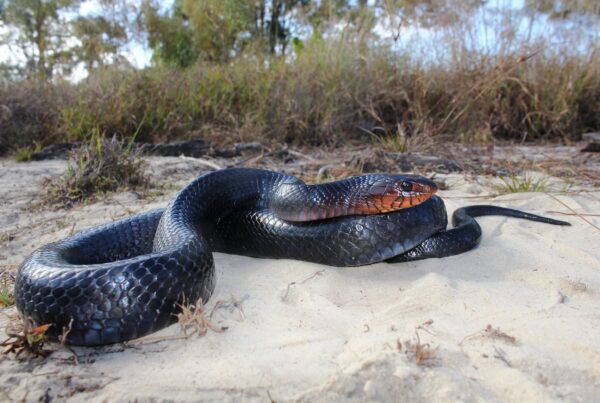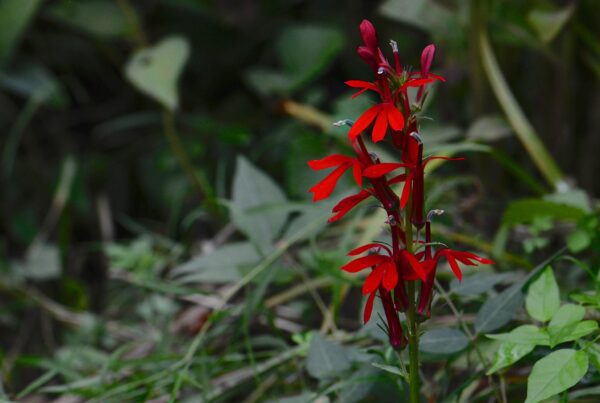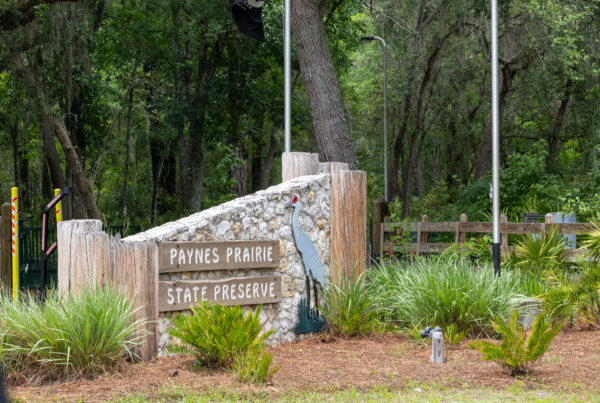As temperatures cool and days grow shorter, Florida’s black bears are on the move, foraging intensively to prepare for the leaner winter months ahead. This seasonal activity is vital for their survival, as they build up the fat stores needed to keep them energized during the colder season. But it also means they’re more likely to roam beyond their typical territories, sometimes venturing into neighborhoods in search of food.

This time of year presents a prime opportunity to learn about these incredible animals and what we can do to help keep both bears and people safe. Here’s what you need to know about Florida black bears and how to “bear-proof” your surroundings this season.
The Florida Black Bear: An Iconic Species
Florida black bears are the only bear species native to the state, historically ranging throughout Florida and parts of southern Georgia, Alabama, and Mississippi. They’re adaptable, thriving in a variety of habitats—from forests and swamps to scrub and pine flatwoods. Today, their population numbers are estimated at around 4,000 individuals statewide, a conservation success made possible through habitat protection and community awareness.

Florida Black Bear by Jan Stefka
These bears are typically solitary and shy, preferring to avoid humans. However, they become more active in their search for food during this season, which can sometimes bring them into human-inhabited areas.
Why Fall Brings Bears Closer to Our Neighborhoods
As black bears prepare for winter, their food intake can nearly double by consuming up to 20,000 calories in a single day! Natural foods like acorns, berries, insects, and small animals are their primary sources of calories, but easy access to human food can be especially enticing. Unsecured trash cans, pet food, and bird feeders can attract bears to suburban and urban neighborhoods, leading to bear-human encounters.
Bear-Proofing Tips to Reduce Bear-Human Interactions
To prevent these interactions and keep bears safe in their natural habitats, follow these bear-proofing tips:
- Secure Trash Cans: Use bear-resistant trash cans or store your trash in a secure place until pick-up day, like a garage or shed. Avoid putting trash out the night before.
- Remove Attractants: Bring pet food and bird feeders indoors when not in use, especially overnight, and clean outdoor grills after use to remove food residue.
- Limit Natural Food: Remove any fruits or vegetables in your garden immediately once ripened, and collect or remove nuts, berries, and seeds from other plants.
- Compost Responsibly: If you compost, do so away from your home and avoid adding any food scraps that may attract bears such as meat, dairy products, or large amounts of fruit.
- Keep a Safe Distance: Never approach a bear or attempt to feed it. If you encounter a bear, remain calm, back away slowly, and give the bear plenty of room to retreat.

Bears attempting to open a bear-proof trash can. Photo by Tim Donovan | FWC
Reflecting on the Passage of House Bill 87
Earlier this year, Florida lawmakers passed HB 87, allowing people to use lethal force against black bears to defend themselves or their property. At the Florida Wildlife Federation, we strongly opposed this bill because it undermines the Florida Fish and Wildlife Conservation Commission (FWC), the state’s constitutional authority on wildlife management. This law sets a worrying precedent, opening the door to more politically-driven, rather than science-based, approaches to wildlife conservation.
The FWC was created to manage Florida’s fish and wildlife based on sound science. Its Black Bear Conservation Rule already provides a balanced plan for addressing bear conflicts, including non-lethal deterrents and permits for rare situations where lethal action might be necessary. By bypassing the FWC’s expertise, HB 87 weakens the state’s ability to responsibly manage Florida’s wildlife and threatens decades of conservation progress.
How We Can Move Forward
The bigger issue behind bear conflicts is habitat loss. As development continues to shrink wild spaces, bears are pushed into neighborhoods in search of food and shelter. The real solution lies in preserving and restoring their habitats while taking steps to reduce human-bear interactions. Simple actions like securing trash cans, removing outdoor food sources, and using bear spray instead of lethal methods can make a huge difference.
Although HB 87 is now law, we remain committed to advocating for science-based, humane solutions that protect both people and wildlife. Together, we can ensure Florida’s black bears—and all our state’s incredible species—have a future in the wild.
This fall, let’s all do our part to respect and protect the Florida black bear. Have you had any bear sightings or experiences? Share your story with us, and help us spread the word on coexisting safely with our wild neighbors!







I think if there were more wildlife special protected arears and less housing and land clearing in that area, we all know that humans and wildlife could coexist together we need the wildlife. Let’s face it man has destroy their way of life.